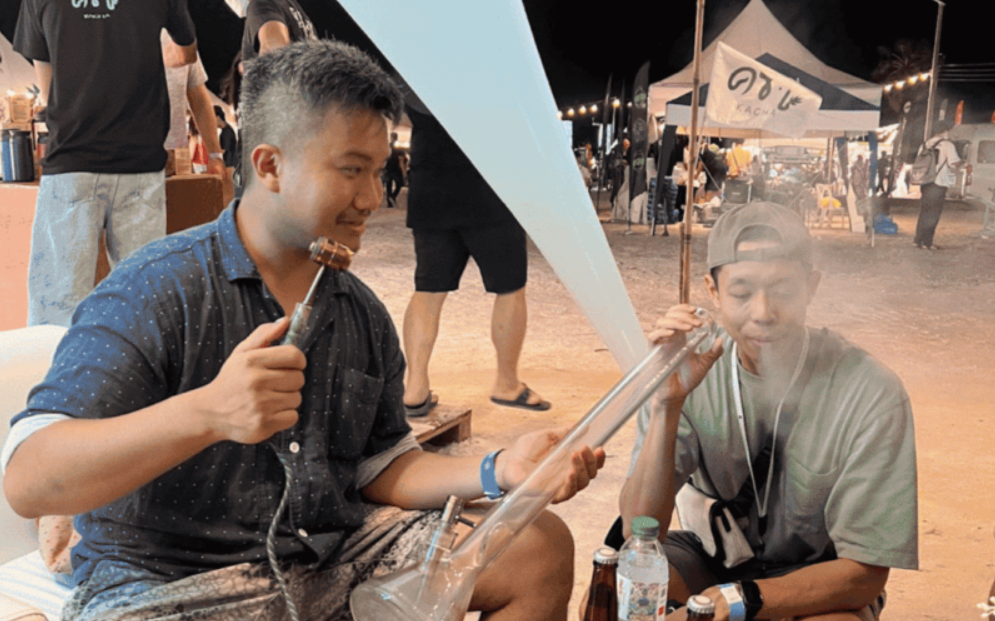Business
Legalaew: Thailand’s Woodstock

If you like bamboo bongs and massive bricks of weed, you’ll love reading about our trip to Legalaew!
Thailand’s politicians erroneously believed that they could establish cannabis regulations before removing the plant from its list of narcotics. The deadline came and went, and a two-day event called “Legalaew”—which translates to “Legal Already”—happened on June 11th and 12th.
Arriving at the Highland event, I didn’t know what to expect. I’d visited Chopaka earlier in the day to purchase my first gram of legal flower. I figured I’d treat myself and opted for a gram of End Game at nearly $30USD. Prices are likely to decrease once the hype dies down a bit. But I have to say, it’s one of the highest-quality nugs I’ve acquired in the Land of Smiles.
Thailand has come a long way from the compressed—yet impressively potent —brick weed tied together with bright red twine. And I suspect that with more influence coming in from abroad, we’ll see even more high-quality herb hitting shelves nationwide.
Ominous clouds and heavy rainfall characterized the first few hours of Legalaew. Shoulder-to-shoulder under a large white tent with other passionate consumers, I wondered whether the event would actually happen.
An hour later, the rain lightened up and the skunky scent of perfectly cured ganja filled the air. With no laws surrounding the plant and public nuisance laws remaining the only tool for policing consumption, it was nearly an absolute free-for-all experience packed with good vibes and smiling faces.

The only thing stickier than the herb being smoked were the mud and sand beneath our feet. It was absolutely caked up from the rain and had everyone watching their steps.
The event took place in the middle of Nakhon Pathom, around an hour and a half from central Bangkok. Joints and bongs were passed around liberally in the open without concern for any consequences, which is something any consumer would appreciate.
This was by far the most freedom I’ve seen at a legal cannabis event, with the excitement of it all increasingly apparent with each step deeper inside. But it wasn’t solely consumers enjoying the carefree atmosphere: Thai musicians performed live on stage. Some wore traditional Rastafarian garments. Others played traditional Thai instruments to accompany their ganja-themed music.
Bloom was in attendance, its simple branding and bright tent were easy to spot. They had various THC- and CBD-infused products available. Treekings OG had two stands, both of which were selling infused snacks and lit with neon lights by the time night came. OG Papers was serving flower and Siam-style hemp papers.

Interestingly, there was a massive installation of the traditional brick weed commonly found throughout Thailand. The majority of this sativa comes in through the borders.
Most who have experienced cannabis in Thailand have done so with brick bud. I’d say this reflects on Thailand’s past and is essential to remember as we progress forward in this space.

I got a chance to talk with Weerachai, owner and operator of Bong Thai, who has been making bamboo bongs for the Bong Thai brand for the last three years. He and his wife, Nilnapa, sell their assortment of handcrafted bamboo bongs and tie-dye fabric products at cannabis events in the Kingdom.
Since Thailand began changing its laws around two years ago, they’ve seen a significant increase in the demand for their Thai-traditional products.
“It’s different from two or three years ago,” he explained. “Now, we’re selling much more than before,” he explained. “In the first year, we were only selling 100, 200, or 300 baht [worth of bongs] per month. Then the second year, we started selling 1,000, 2,000, and 3,000 baht [of goods] per month. Now, we’re selling 10,000+ baht worth of bongs per month.”

I also had the pleasure of speaking with Kenny, Boom, and Broccoli from Kacha, a company that started producing cannabis concentrates at the beginning of the pandemic right after vitamin E and heavy metals in shoddy vape cartridges sparked fear in the hearts of terp lovers globally.
“We started off saying that we should create a Thai brand that doesn’t contain any harmful filler product, no filler, no heavy metals. All of them have to be checked here by us,” Kenny explained. “We check that the product is 100% clean and we then move on from there.”
The Kacha team understands what it takes to establish a market that lacks education. They’re working tirelessly to support consumers in Thailand, as well as outside of the Kingdom.
“We’re trying to build a market at the moment, and we have multiple sales happening around the world, mainly in California. But first, we have to build an idea here, a beautiful image of a Thai brand,” Kenny said. “We’re hosting events now. We hosted a yachting experience last month, and we used this product called Zenco, which is a cannabis concentrate in a drinkable form. The yachting event was fun, successful, and one of the first cannabis yachting experiences in Pattaya and Thailand. We might host another one soon.”

Equally important to mention is the Rescue & First Aid booth on-site. They had a few situations over the course of Legalaew. Fortunately, none were too serious.
“It’s our responsibility to make sure everyone is safe at the event,” explained the head of Rescue & First Aid, Bank. “On the first day, we had a woman who was crying and too high in the water after eating an infused brownie. We went in and took her out of the water, checked her out to make sure she was stable, but she was all right after so we didn’t need to send her to the hospital.”
Source: https://hightimes.com/events/legalaew-thailands-woodstock/
Business
New Mexico cannabis operator fined, loses license for alleged BioTrack fraud

New Mexico regulators fined a cannabis operator nearly $300,000 and revoked its license after the company allegedly created fake reports in the state’s traceability software.
The New Mexico Cannabis Control Division (CCD) accused marijuana manufacturer and retailer Golden Roots of 11 violations, according to Albuquerque Business First.
Golden Roots operates the The Cannabis Revolution Dispensary.
The majority of the violations are related to the Albuquerque company’s improper use of BioTrack, which has been New Mexico’s track-and-trace vendor since 2015.
The CCD alleges Golden Roots reported marijuana production only two months after it had received its vertically integrated license, according to Albuquerque Business First.
Because cannabis takes longer than two months to be cultivated, the CCD was suspicious of the report.
After inspecting the company’s premises, the CCD alleged Golden Roots reported cultivation, transportation and sales in BioTrack but wasn’t able to provide officers who inspected the site evidence that the operator was cultivating cannabis.
In April, the CCD revoked Golden Roots’ license and issued a $10,000 fine, according to the news outlet.
The company requested a hearing, which the regulator scheduled for Sept. 1.
At the hearing, the CCD testified that the company’s dried-cannabis weights in BioTrack were suspicious because they didn’t seem to accurately reflect how much weight marijuana loses as it dries.
Company employees also poorly accounted for why they were making adjustments in the system of up to 24 pounds of cannabis, making comments such as “bad” or “mistake” in the software, Albuquerque Business First reported.
Golden Roots was fined $298,972.05 – the amount regulators allege the company made selling products that weren’t properly accounted for in BioTrack.
The CCD has been cracking down on cannabis operators accused of selling products procured from out-of-state or not grown legally:
- Regulators alleged in August that Albuquerque dispensary Sawmill Sweet Leaf sold out-of-state products and didn’t have a license for extraction.
- Paradise Exotics Distro lost its license in July after regulators alleged the company sold products made in California.
Golden Roots was the first alleged rulebreaker in New Mexico to be asked to pay a large fine.
Source: https://mjbizdaily.com/new-mexico-cannabis-operator-fined-loses-license-for-alleged-biotrack-fraud/
Business
Marijuana companies suing US attorney general in federal prohibition challenge

Four marijuana companies, including a multistate operator, have filed a lawsuit against U.S. Attorney General Merrick Garland in which they allege the federal MJ prohibition under the Controlled Substances Act is no longer constitutional.
According to the complaint, filed Thursday in U.S. District Court in Massachusetts, retailer Canna Provisions, Treevit delivery service CEO Gyasi Sellers, cultivator Wiseacre Farm and MSO Verano Holdings Corp. are all harmed by “the federal government’s unconstitutional ban on cultivating, manufacturing, distributing, or possessing intrastate marijuana.”
Verano is headquartered in Chicago but has operations in Massachusetts; the other three operators are based in Massachusetts.
The lawsuit seeks a ruling that the “Controlled Substances Act is unconstitutional as applied to the intrastate cultivation, manufacture, possession, and distribution of marijuana pursuant to state law.”
The companies want the case to go before the U.S. Supreme Court.
They hired prominent law firm Boies Schiller Flexner to represent them.
The New York-based firm’s principal is David Boies, whose former clients include Microsoft, former presidential candidate Al Gore and Elizabeth Holmes’ disgraced startup Theranos.
Similar challenges to the federal Controlled Substances Act (CSA) have failed.
One such challenge led to a landmark Supreme Court decision in 2005.
In Gonzalez vs. Raich, the highest court in the United States ruled in a 6-3 decision that the commerce clause of the U.S. Constitution gave Congress the power to outlaw marijuana federally, even though state laws allow the cultivation and sale of cannabis.
In the 18 years since that ruling, 23 states and the District of Columbia have legalized adult-use marijuana and the federal government has allowed a multibillion-dollar cannabis industry to thrive.
Since both Congress and the U.S. Department of Justice, currently headed by Garland, have declined to intervene in state-licensed marijuana markets, the key facts that led to the Supreme Court’s 2005 ruling “no longer apply,” Boies said in a statement Thursday.
“The Supreme Court has since made clear that the federal government lacks the authority to regulate purely intrastate commerce,” Boies said.
“Moreover, the facts on which those precedents are based are no longer true.”
Verano President Darren Weiss said in a statement the company is “prepared to bring this case all the way to the Supreme Court in order to align federal law with how Congress has acted for years.”
While the Biden administration’s push to reschedule marijuana would help solve marijuana operators’ federal tax woes, neither rescheduling nor modest Congressional reforms such as the SAFER Banking Act “solve the fundamental issue,” Weiss added.
“The application of the CSA to lawful state-run cannabis business is an unconstitutional overreach on state sovereignty that has led to decades of harm, failed businesses, lost jobs, and unsafe working conditions.”
Business
Alabama to make another attempt Dec. 1 to award medical cannabis licenses

Alabama regulators are targeting Dec. 1 to award the first batch of medical cannabis business licenses after the agency’s first two attempts were scrapped because of scoring errors and litigation.
The first licenses will be awarded to individual cultivators, delivery providers, processors, dispensaries and state testing labs, according to the Alabama Medical Cannabis Commission (AMCC).
Then, on Dec. 12, the AMCC will award licenses for vertically integrated operations, a designation set primarily for multistate operators.
Licenses are expected to be handed out 28 days after they have been awarded, so MMJ production could begin in early January, according to the Alabama Daily News.
That means MMJ products could be available for patients around early March, an AMCC spokesperson told the media outlet.
Regulators initially awarded 21 business licenses in June, only to void them after applicants alleged inconsistencies with how the applications were scored.
Then, in August, the state awarded 24 different licenses – 19 went to June recipients – only to reverse themselves again and scratch those licenses after spurned applicants filed lawsuits.
A state judge dismissed a lawsuit filed by Chicago-based MSO Verano Holdings Corp., but another lawsuit is pending.
Source: https://mjbizdaily.com/alabama-plans-to-award-medical-cannabis-licenses-dec-1/
-

 Business2 years ago
Business2 years agoPot Odor Does Not Justify Probable Cause for Vehicle Searches, Minnesota Court Affirms
-

 Business2 years ago
Business2 years agoNew Mexico cannabis operator fined, loses license for alleged BioTrack fraud
-

 Business2 years ago
Business2 years agoAlabama to make another attempt Dec. 1 to award medical cannabis licenses
-

 Business2 years ago
Business2 years agoWashington State Pays Out $9.4 Million in Refunds Relating to Drug Convictions
-

 Business2 years ago
Business2 years agoMarijuana companies suing US attorney general in federal prohibition challenge
-

 Business2 years ago
Business2 years agoLegal Marijuana Handed A Nothing Burger From NY State
-

 Business2 years ago
Business2 years agoCan Cannabis Help Seasonal Depression
-

 Blogs2 years ago
Blogs2 years agoCannabis Art Is Flourishing On Etsy













